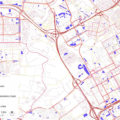This academic paper was written together with Dr. Bardia Mashhoodi (Wageningen University & Research, Wageningen, Netherlands) in the context of the EVA project (Electrical Vehicle Charging Infrastructure for the Amsterdam Metropolitan Area). Abstract: This study develops a multiscale model for allocation of EV infrastructure to accommodate residents’ demand during nights and that of residents and […]
Mobility; Parking capacity; Electricity demand; GIS; Amsterdam Metropolitan Area Data article, developed with Bardia Mashhoodi for Data in Brief journal in the context of the EVA research project. Abstract: The dataset combines and aggregate five data types of the Amsterdam Metropolitan Area in a polygon GIS shapefile with 79 three-digit postcode areas, and a csv […]
Electric Vehicle Charging Infrastructure for Amsterdam Metropolitan Region (EVA) project is a research project developed by Wageningen University & Research, commissioned by the VerDuS program Smart Urban Regions of the Future. The objective of the project is to develop approaches to determine how and where to locate electric vehicle charging infrastructure. The study is multi-scalar, […]
Circular economy; cities and territories; socio-ecological transition; resource flows Chapter co-authored with Cecilia Furlan, Alexander Wandl and Chiara Cavalieri, published in Amenta L., Russo M., van Timmeren A. (eds) Regenerative Territories. GeoJournal Library, vol 128. Springer, Cham Abstract: Nowadays, the circularity concept dominates the debate on resource management in cities and territories. The idea is often used as […]
Stakeholder; Waste collection; LCA; Local impacts; Multi-criteria decision analysis; Circular Economy Journal paper co-authored with Davide Tonini, Alexander Wandl, KozmoMeister, Sue Ellen Taelman, David Sanjuan-Delmás, Jo Dewulf and DriesHuygens, published in Resources, Conservation and Recycling, Volume 160. Abstract: Food waste represents the largest fraction of the municipal solid waste generated in Europe and its management […]
The project REsource Management in Peri-urban Areas: Going Beyond Urban Metabolism was funded by the EU under a H2020 scheme. Its main objective was to provide local and regional authorities with an innovative transdisciplinary and open-source geodesign decision support environment (GDSE) developed and implemented in living labs in six metropolitan areas. The GDSE allows creating […]





